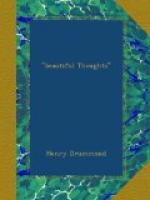December 6th. To say that the organism contains within itself only one-half of what is essential to life, is to repeat the evangelical confession, so worn and yet so true to universal experience, of the utter helplessness of man. Natural Law, p. 268.
December 7th. Who has not come to the conclusion that he is but a part, a fraction of some larger whole? Who does not miss at every turn of his life an absent God? That man is but a part, he knows, for there is room in him for more. That God is the other part, he feels, because at times He satisfies his need. Who does not tremble often under that sicklier symptom of his incompleteness, his want of spiritual energy, his helplessness with sin? But now he understands both—the void in his life, the powerlessness of his will. He understands that, like all other energy, spiritual power is contained in Environment. He finds here at last the true root of all human frailty, emptiness, nothingness, sin. This is why “without Me ye can do nothing.” Powerless is the normal state not only of this but of every organism—of every organism apart from its Environment. Natural Law, p. 268.
December 8th. To seize continuously the opportunity of more and more perfect adjustment to better and higher conditions, to balance some inward evil with some purer influence acting from without, in a word to make our Environment at the same time that it is making us—these are the secrets of a well-ordered and successful life. Natural Law, p. 256.
December 9th. In the spiritual world the subtle influences which form and transform the soul are Heredity and Environment. And here especially, where all is invisible, where much that we feel to be real is yet so ill-defined, it becomes of vital practical moment to clarify the atmosphere as far as possible with conceptions borrowed from the natural life. Natural Law, p. 256.
December 10th. These lower correspondences are in their nature unfitted for an Eternal Life. Even if they were perfect in their relation to their Environment, they would still not be Eternal. However opposed, apparently, to the scientific definition of Eternal Life, it is yet true that perfect correspondence with Environment is not Eternal Life. . . . An Eternal Life demands an Eternal Environment. Natural Law, p. 245.
December 11th. On what does the Christian argument for Immortality really rest? It stands upon the pedestal on which the theologian rests the whole of historical Christianity—the Resurrection of Jesus Christ. Natural Law, p. 234.
December 12th. The soul which has no correspondence with the spiritual environment is spiritually dead. It may be that it never possessed . . . the spiritual ear, or a heart which throbbed in response to the love of God. If so, having never lived, it cannot be said to have died. But not to have these correspondences is to be in the state of Death. To the spiritual world, to the Divine Environment, it is dead—as a stone which has never lived is dead to the environment of the organic world. Natural Law, p. 177.




